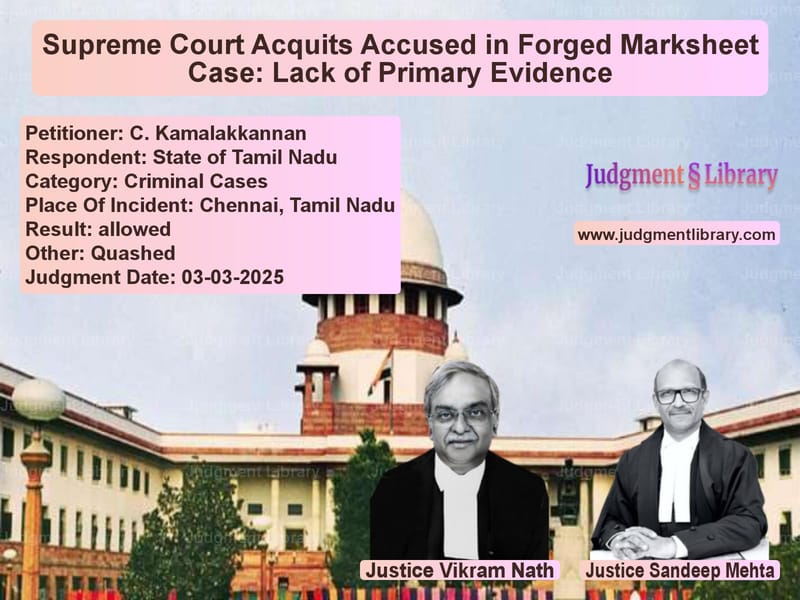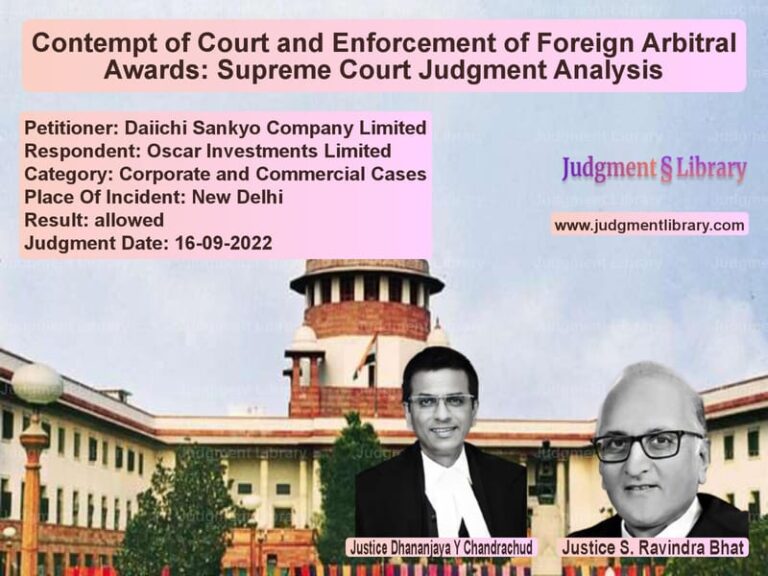Supreme Court Acquits Accused in Forged Marksheet Case: Lack of Primary Evidence
The Supreme Court of India recently delivered a significant judgment in C. Kamalakkannan v. State of Tamil Nadu, overturning the conviction of the accused in a case involving a forged marksheet used for MBBS admission. The ruling emphasized the importance of primary evidence in criminal trials and the limited evidentiary value of expert testimony when foundational documents are missing.
Background of the Case
The case dates back to 1996, when a student, Kumari Amudha, submitted a marksheet to gain admission into an MBBS course. Upon verification, authorities discovered that the marksheet was forged. While her actual score was 767 out of 1200, the forged document stated 1120 out of 1200. The authorities launched an investigation, leading to the arrest of multiple accused, including the appellant, C. Kamalakkannan.
A criminal case was registered as Crime No. 2172 of 1996, and charges were framed under:
- Section 120B IPC (Criminal Conspiracy)
- Section 468 IPC (Forgery for Purpose of Cheating)
- Section 471 IPC (Using a Forged Document as Genuine)
Trial Court’s Decision
The Judicial Magistrate No. 1, Thiruvallur, convicted the appellant in Calendar Case No. 279 of 2011. The sentence included:
- Imprisonment already undergone during the trial (from October 22, 1996, to November 16, 1996).
- A fine of ₹1,000 under Section 120B IPC.
- A fine of ₹1,000 under Section 468 IPC.
- A fine of ₹2,000 under Section 471 IPC (for two counts).
Appeals and High Court Proceedings
The appellant challenged the conviction before the Principal Sessions Judge, Thiruvallur. The appellate court upheld the conviction but reduced the fine to ₹600 on each count. Subsequently, the appellant filed a Criminal Revision Petition (No. 1601 of 2017) in the Madras High Court, which was dismissed on April 16, 2019.
Arguments Before the Supreme Court
Petitioner’s (Appellant’s) Arguments
- The sole allegation against the appellant was that he prepared the postal cover in which the forged marksheet was sent, yet the original postal cover was never produced as evidence.
- The Trial Court erred by relying on the testimony of a co-accused, which is inadmissible unless independently corroborated.
- The handwriting expert’s report (PW-18) lacked evidentiary value since it was based on a photocopy rather than the original postal cover.
- The prosecution failed to establish beyond reasonable doubt that the handwriting on the postal cover belonged to the appellant.
Respondent’s (State of Tamil Nadu’s) Arguments
- The prosecution argued that the case against the appellant was strong because the handwriting expert confirmed that the appellant’s handwriting matched the one on the postal cover.
- The father of the student, Vijaya Kumar (PW-9), initially testified as a prosecution witness but was later summoned as an accused, and his testimony was deemed unreliable.
- Although the original postal cover was missing, its photocopy was sufficient to establish guilt.
- The Madras High Court had correctly affirmed the conviction, given the strength of the forensic evidence.
Supreme Court’s Analysis
1. Missing Primary Evidence: The Postal Cover
The Supreme Court held that the prosecution’s failure to produce the original postal cover was a fundamental flaw:
“The prosecution miserably failed to prove the existence of the disputed postal cover. Since the postal cover itself was not exhibited and proved in evidence, there is no question of accepting the prosecution theory that it bore the handwriting of the accused.”
2. Handwriting Expert’s Testimony
The Court reiterated that expert testimony is not conclusive proof and must be corroborated:
“While the opinion of a handwriting expert may be relevant under Section 45 of the Evidence Act, it must be tested against other evidence. The original document was never placed before the expert, making his opinion unreliable.”
3. Lack of Corroboration
The Court criticized the reliance on the co-accused’s testimony, stating:
“The trial court placed reliance on the deposition of a co-accused, which is legally untenable. Conviction cannot be based on an accomplice’s testimony unless corroborated by independent evidence.”
4. Evidentiary Standards for Criminal Conviction
The judgment cited Murari Lal v. State of M.P. (1980), which established that expert evidence alone is insufficient to convict unless corroborated by primary evidence. The Court emphasized that:
“A criminal conviction requires proof beyond reasonable doubt. The prosecution failed to meet this standard due to the missing primary evidence and unreliable forensic testimony.”
Final Judgment
The Supreme Court quashed the conviction and allowed the appeal, stating:
“The impugned judgments dated October 25, 2016 (Trial Court), October 23, 2017 (Appellate Court), and April 16, 2019 (High Court) are hereby set aside. The appellant is acquitted of all charges.”
Key Takeaways from the Judgment
- Primary evidence is essential: The prosecution cannot rely on secondary evidence like photocopies when the original document is missing.
- Expert testimony requires corroboration: Handwriting expert opinions must be supported by primary evidence to be admissible.
- Co-accused testimony is insufficient: Courts cannot convict based solely on an accomplice’s statement.
- Beyond reasonable doubt standard: The ruling reinforces that criminal convictions must be based on irrefutable proof.
Conclusion
The Supreme Court’s decision in C. Kamalakkannan v. State of Tamil Nadu serves as a landmark ruling reinforcing the necessity of primary evidence in criminal trials. By acquitting the accused due to lack of foundational documents, the Court reaffirmed the principle that procedural fairness and evidentiary standards must be upheld to ensure justice. This judgment will serve as a precedent in similar cases where reliance on secondary evidence is contested.
Petitioner Name: C. Kamalakkannan.Respondent Name: State of Tamil Nadu.Judgment By: Justice Vikram Nath, Justice Sandeep Mehta.Place Of Incident: Chennai, Tamil Nadu.Judgment Date: 03-03-2025.
Don’t miss out on the full details! Download the complete judgment in PDF format below and gain valuable insights instantly!
Download Judgment: c.-kamalakkannan-vs-state-of-tamil-nadu-supreme-court-of-india-judgment-dated-03-03-2025.pdf
Directly Download Judgment: Directly download this Judgment
See all petitions in Fraud and Forgery
See all petitions in Bail and Anticipatory Bail
See all petitions in Judgment by Vikram Nath
See all petitions in Judgment by Sandeep Mehta
See all petitions in allowed
See all petitions in Quashed
See all petitions in supreme court of India judgments March 2025
See all petitions in 2025 judgments
See all posts in Criminal Cases Category
See all allowed petitions in Criminal Cases Category
See all Dismissed petitions in Criminal Cases Category
See all partially allowed petitions in Criminal Cases Category







